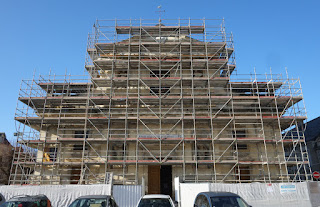The church buildings of France are generally the responsibility of the town hall rather than the episcopate. So expensive restoration of listed historic buildings is either a subject of civic pride and duty or a financial money pit for the poor commune and its tax-payers.
 |
| The old Abbé thinks that the brothers Lemercier would have liked this 'rigorous' layout of scaffolding; so neo-classical....... |
The history of church and state
Title III: Buildings of worship
- Article 12 declares that all buildings which the state has made available to religious organizations will remain the property of the state pursuant to the provisions in the following articles. (This article was amended in 1998.)
- Article 13 specifies that the "buildings used for public worship, and movable objects furnishing them will be left free of charge to public institutions of worship", details the methods by which disputed ownership may be determined, and describes procedures for reclamation of properties and fixtures abandoned by religious organizations. (This article was modified in 2015.)
- Article 14 provides the same directives as Article 13 for "Archdioceses, bishoprics, parsonages and their dependency, big seminaries and faculties of Protestant theology".
- Article 15 specifies that, "in the departments of the Savoy, the Haute Savoie and Alpes-Maritimes" buildings used "for the exercise of worship or for the accommodation of their ministers" may be "allocated by villages on the territory from which they are" pursuant to Article 12, while "cemeteries remain the property of the villages".
- Article 16 creates a special category for "buildings for public religious worship (cathedrals, churches, chapels, temples, synagogues, archbishops, bishops, presbyters, seminars), in which will be included all of these buildings representative in whole or in parts, artistic or historical value."
- Article 17 establishes that the sale of any buildings covered by the above articles shall be offered to: "1 religious associations; 2 communes; 3 departments; 4. Museums and art and archaeology societies; 5 to the state," in that order.



















No comments:
Post a Comment